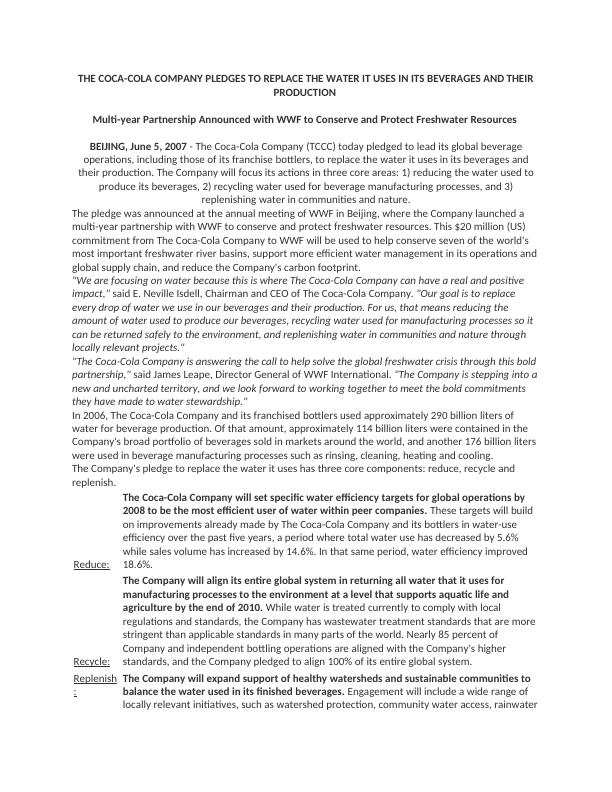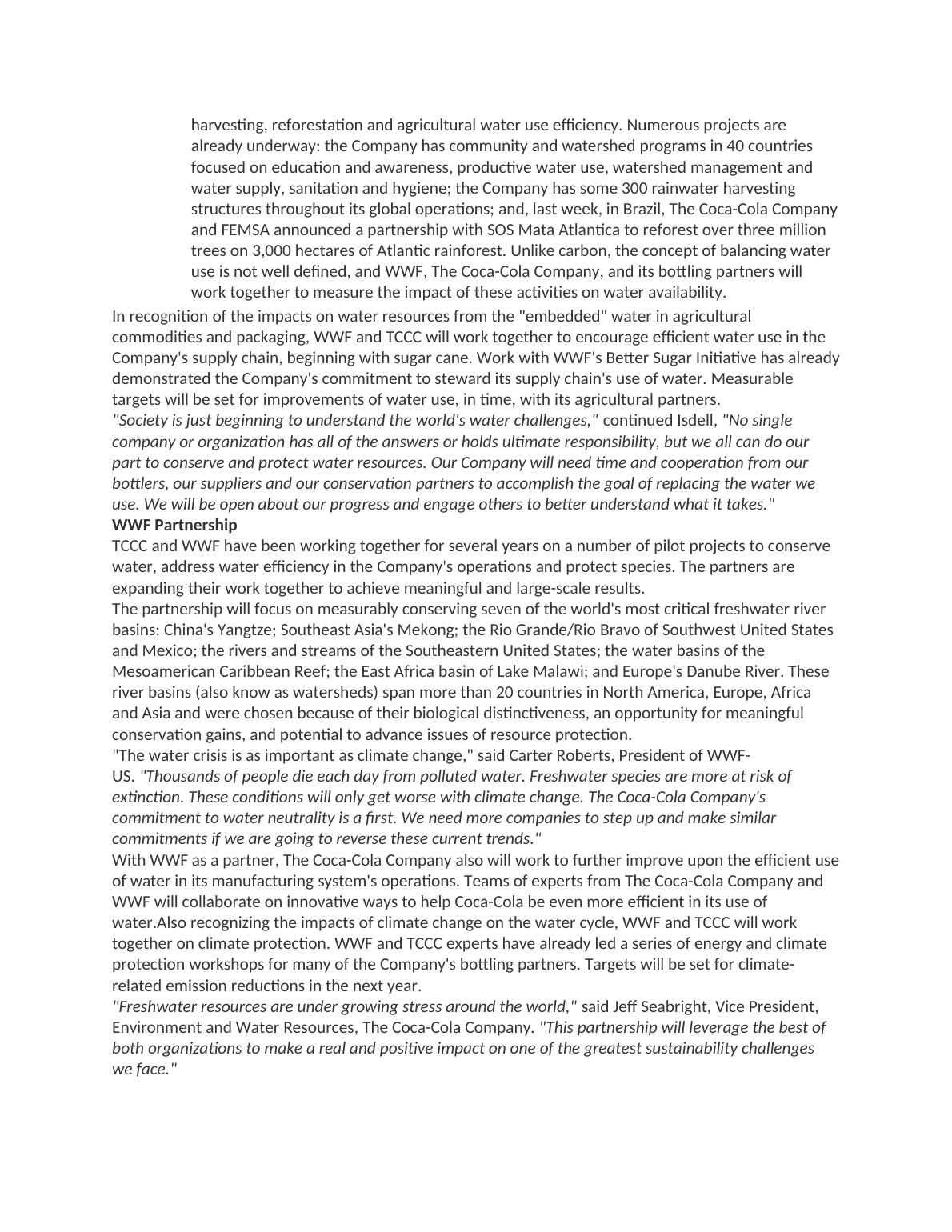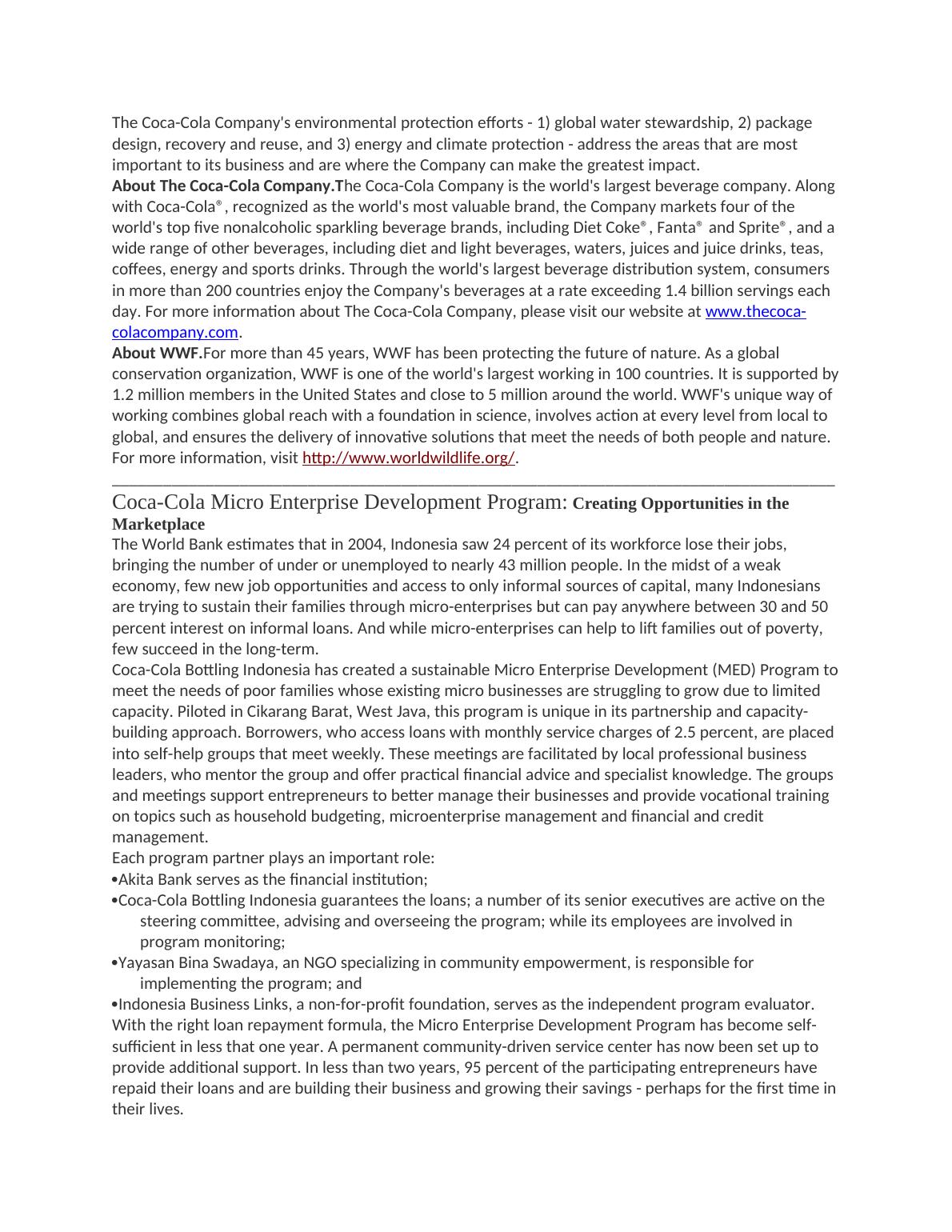Ask a question from expert
Pledges to Replace Water | Coca-Cola Company
6 Pages3398 Words266 Views
Added on 2019-09-16
Pledges to Replace Water | Coca-Cola Company
Added on 2019-09-16
BookmarkShareRelated Documents
THE COCA-COLA COMPANY PLEDGES TO REPLACE THE WATER IT USES IN ITS BEVERAGES AND THEIRPRODUCTIONMulti-year Partnership Announced with WWF to Conserve and Protect Freshwater ResourcesBEIJING, June 5, 2007- The Coca-Cola Company (TCCC) today pledged to lead its global beverageoperations, including those of its franchise bottlers, to replace the water it uses in its beverages andtheir production. The Company will focus its actions in three core areas: 1) reducing the water used toproduce its beverages, 2) recycling water used for beverage manufacturing processes, and 3)replenishing water in communities and nature.The pledge was announced at the annual meeting of WWF in Beijing, where the Company launched a multi-year partnership with WWF to conserve and protect freshwater resources. This $20 million (US)commitment from The Coca-Cola Company to WWF will be used to help conserve seven of the world'smost important freshwater river basins, support more efficient water management in its operations andglobal supply chain, and reduce the Company's carbon footprint."We are focusing on water because this is where The Coca-Cola Company can have a real and positive impact,"said E. Neville Isdell, Chairman and CEO of The Coca-Cola Company."Our goal is to replace every drop of water we use in our beverages and their production. For us, that means reducing the amount of water used to produce our beverages, recycling water used for manufacturing processes so it can be returned safely to the environment, and replenishing water in communities and nature through locally relevant projects.""The Coca-Cola Company is answering the call to help solve the global freshwater crisis through this boldpartnership,"said James Leape, Director General of WWF International. "The Company is stepping into anew and uncharted territory, and we look forward to working together to meet the bold commitments they have made to water stewardship."In 2006, The Coca-Cola Company and its franchised bottlers used approximately 290 billion liters of water for beverage production. Of that amount, approximately 114 billion liters were contained in theCompany's broad portfolio of beverages sold in markets around the world, and another 176 billion literswere used in beverage manufacturing processes such as rinsing, cleaning, heating and cooling.The Company's pledge to replace the water it uses has three core components: reduce, recycle andreplenish.Reduce:The Coca-Cola Company will set specific water efficiency targets for global operations by 2008 to be the most efficient user of water within peer companies.These targets will buildon improvements already made by The Coca-Cola Company and its bottlers in water-useefficiency over the past five years, a period where total water use has decreased by 5.6%while sales volume has increased by 14.6%. In that same period, water efficiency improved18.6%.Recycle:The Company will align its entire global system in returning all water that it uses for manufacturing processes to the environment at a level that supports aquatic life and agriculture by the end of 2010.While water is treated currently to comply with localregulations and standards, the Company has wastewater treatment standards that are morestringent than applicable standards in many parts of the world. Nearly 85 percent of Company and independent bottling operations are aligned with the Company's higherstandards, and the Company pledged to align 100% of its entire global system.Replenish:The Company will expand support of healthy watersheds and sustainable communities to balance the water used in its finished beverages.Engagement will include a wide range of locally relevant initiatives, such as watershed protection, community water access, rainwater

harvesting, reforestation and agricultural water use efficiency. Numerous projects arealready underway: the Company has community and watershed programs in 40 countriesfocused on education and awareness, productive water use, watershed management andwater supply, sanitation and hygiene; the Company has some 300 rainwater harvestingstructures throughout its global operations; and, last week, in Brazil, The Coca-Cola Companyand FEMSA announced a partnership with SOS Mata Atlantica to reforest over three milliontrees on 3,000 hectares of Atlantic rainforest. Unlike carbon, the concept of balancing wateruse is not well defined, and WWF, The Coca-Cola Company, and its bottling partners willwork together to measure the impact of these activities on water availability.In recognition of the impacts on water resources from the "embedded" water in agriculturalcommodities and packaging, WWF and TCCC will work together to encourage efficient water use in theCompany's supply chain, beginning with sugar cane. Work with WWF's Better Sugar Initiative has alreadydemonstrated the Company's commitment to steward its supply chain's use of water. Measurabletargets will be set for improvements of water use, in time, with its agricultural partners."Society is just beginning to understand the world's water challenges,"continued Isdell,"No single company or organization has all of the answers or holds ultimate responsibility, but we all can do our part to conserve and protect water resources. Our Company will need time and cooperation from our bottlers, our suppliers and our conservation partners to accomplish the goal of replacing the water we use. We will be open about our progress and engage others to better understand what it takes."WWF PartnershipTCCC and WWF have been working together for several years on a number of pilot projects to conservewater, address water efficiency in the Company's operations and protect species. The partners areexpanding their work together to achieve meaningful and large-scale results.The partnership will focus on measurably conserving seven of the world's most critical freshwater riverbasins: China's Yangtze; Southeast Asia's Mekong; the Rio Grande/Rio Bravo of Southwest United Statesand Mexico; the rivers and streams of the Southeastern United States; the water basins of theMesoamerican Caribbean Reef; the East Africa basin of Lake Malawi; and Europe's Danube River. Theseriver basins (also know as watersheds) span more than 20 countries in North America, Europe, Africaand Asia and were chosen because of their biological distinctiveness, an opportunity for meaningfulconservation gains, and potential to advance issues of resource protection."The water crisis is as important as climate change," said Carter Roberts, President of WWF-US."Thousands of people die each day from polluted water. Freshwater species are more at risk of extinction. These conditions will only get worse with climate change. The Coca-Cola Company's commitment to water neutrality is a first. We need more companies to step up and make similar commitments if we are going to reverse these current trends."With WWF as a partner, The Coca-Cola Company also will work to further improve upon the efficient useof water in its manufacturing system's operations. Teams of experts from The Coca-Cola Company andWWF will collaborate on innovative ways to help Coca-Cola be even more efficient in its use of water.Also recognizing the impacts of climate change on the water cycle, WWF and TCCC will worktogether on climate protection. WWF and TCCC experts have already led a series of energy and climateprotection workshops for many of the Company's bottling partners. Targets will be set for climate-related emission reductions in the next year."Freshwater resources are under growing stress around the world,"said Jeff Seabright, Vice President,Environment and Water Resources, The Coca-Cola Company. "This partnership will leverage the best of both organizations to make a real and positive impact on one of the greatest sustainability challenges we face."

The Coca-Cola Company's environmental protection efforts - 1) global water stewardship, 2) packagedesign, recovery and reuse, and 3) energy and climate protection - address the areas that are mostimportant to its business and are where the Company can make the greatest impact.About The Coca-Cola Company.The Coca-Cola Company is the world's largest beverage company. Alongwith Coca-Cola®, recognized as the world's most valuable brand, the Company markets four of theworld's top five nonalcoholic sparkling beverage brands, including Diet Coke®, Fanta® and Sprite®, and a wide range of other beverages, including diet and light beverages, waters, juices and juice drinks, teas,coffees, energy and sports drinks. Through the world's largest beverage distribution system, consumersin more than 200 countries enjoy the Company's beverages at a rate exceeding 1.4 billion servings eachday. For more information about The Coca-Cola Company, please visit our website atwww.thecoca-colacompany.com.About WWF.For more than 45 years, WWF has been protecting the future of nature. As a globalconservation organization, WWF is one of the world's largest working in 100 countries. It is supported by1.2 million members in the United States and close to 5 million around the world. WWF's unique way of working combines global reach with a foundation in science, involves action at every level from local to global, and ensures the delivery of innovative solutions that meet the needs of both people and nature.For more information, visithttp://www.worldwildlife.org/._____________________________________________________________________________________Coca-Cola Micro Enterprise Development Program: Creating Opportunities in the MarketplaceThe World Bank estimates that in 2004, Indonesia saw 24 percent of its workforce lose their jobs,bringing the number of under or unemployed to nearly 43 million people. In the midst of a weakeconomy, few new job opportunities and access to only informal sources of capital, many Indonesiansare trying to sustain their families through micro-enterprises but can pay anywhere between 30 and 50 percent interest on informal loans. And while micro-enterprises can help to lift families out of poverty,few succeed in the long-term.Coca-Cola Bottling Indonesia has created a sustainable Micro Enterprise Development (MED) Program tomeet the needs of poor families whose existing micro businesses are struggling to grow due to limitedcapacity. Piloted in Cikarang Barat, West Java, this program is unique in its partnership and capacity-building approach. Borrowers, who access loans with monthly service charges of 2.5 percent, are placedinto self-help groups that meet weekly. These meetings are facilitated by local professional businessleaders, who mentor the group and offer practical financial advice and specialist knowledge. The groupsand meetings support entrepreneurs to better manage their businesses and provide vocational trainingon topics such as household budgeting, microenterprise management and financial and creditmanagement.Each program partner plays an important role:Akita Bank serves as the financial institution;Coca-Cola Bottling Indonesia guarantees the loans; a number of its senior executives are active on thesteering committee, advising and overseeing the program; while its employees are involved in program monitoring;Yayasan Bina Swadaya, an NGO specializing in community empowerment, is responsible forimplementing the program; andIndonesia Business Links, a non-for-profit foundation, serves as the independent program evaluator.With the right loan repayment formula, the Micro Enterprise Development Program has become self-sufficient in less that one year. A permanent community-driven service center has now been set up to provide additional support. In less than two years, 95 percent of the participating entrepreneurs haverepaid their loans and are building their business and growing their savings - perhaps for the first time intheir lives.

End of preview
Want to access all the pages? Upload your documents or become a member.
Related Documents
The Coca Cola Company: Marketing Strategy.lg...
|16
|4509
|30
PESTLE And SWOT Analysis of The Coca Cola Companylg...
|16
|4495
|112
Applied Logistics and Supply Chain Managementlg...
|10
|3016
|21
Sustainability Challenges for 21st Century Knowledge Organizationslg...
|10
|2342
|381
Business Sustainability Discussion 2022lg...
|4
|744
|22